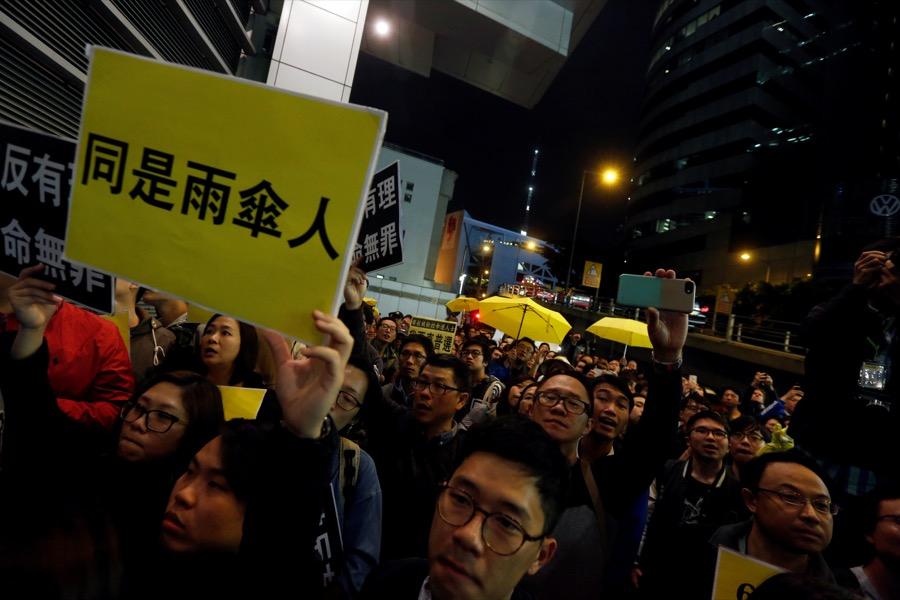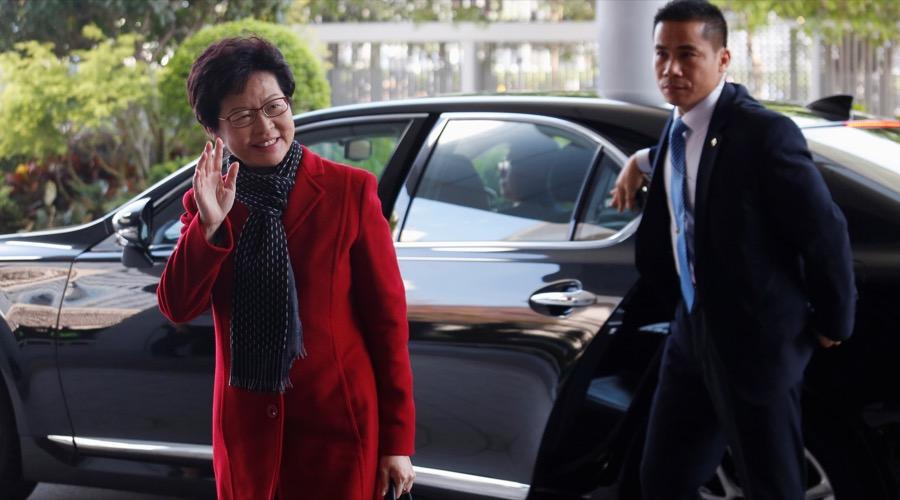Hong Kong picked its first female leader, but critics worry she’s too close to Beijing
Newly elected Chief Executive Carrie Lam arrives to meet current leader Leung Chun-ying in Hong Kong on March 27. She's set to take over in July.
Police cracked down on Hong Kong democracy activists Monday, charging them over the Umbrella Movement mass protests, a day after a pro-Beijing candidate was chosen as the city's new leader.
Carrie Lam was selected as the new chief executive on Sunday by a committee dominated by pro-China voters — the first woman picked to govern Hong Kong. She promised to try to unify the deeply divided city.
The vote was dismissed as a sham by democracy campaigners who fear Beijing is tightening its grip on semi-autonomous Hong Kong. Critics say Lam will be no different from its unpopular current leader, Leung Chun-ying.
Those concerns were heightened on Monday when police charged nine leading campaigners who took part in the Umbrella Movement of 2014 — including student protesters and lawmakers — in connection with the rallies.
The protests saw tens of thousands take to the streets calling for fully free leadership elections, but failed to win concessions from Beijing.
Rights group Amnesty International said the police charges showed the city's freedom of expression and right to peaceful assembly was "under a sustained attack."
All nine activists reported to Wan Chai police station Monday night, with around 200 supporters gathering outside.
They were all charged with either conspiring to cause public nuisance or inciting others to do so. They will appear in court Thursday.
The activists range in ages from 22 to 73 years old and police said they had been charged "in connection with the illegal Occupy Movement" of 2014.
Civic Party lawmaker Tanya Chan described the move as a "death kiss" from Leung, who will step down in July.

Chan said she had been arrested at the end of the protests, but had never been charged before.
Professor Chan Kin-man, a founding member of Occupy Central, one of the groups behind the 2014 rallies, called the charges "ridiculous."
Speaking outside the police station Monday night, Chan said the prosecutions would not deter the fight for democracy.
"We are honored to have participated in the Umbrella Movement," he told supporters.
Future targets
The crackdown comes less than four months ahead of Lam's inauguration on July 1, when China's President Xi Jinping is expected to visit Hong Kong to mark the 20th anniversary of the handover of the city by Britain back to China in 1997.
"It does somehow protect the 20th anniversary ceremony in the sense that it deters the protesters from conducting any radical or violent campaigns," said political analyst Edmund Cheng of Hong Kong Baptist University.
Young legislator Nathan Law, one of the leaders of the Umbrella Movement, was among the supporters outside the police station and said he expected to be the "next target."
"But for us, the harder you suppress us, the harder we bounce back," he said.
Law was already convicted last year with fellow student leaders Joshua Wong and Alex Chow for taking part in, or inciting others to take part in, an anti-China protest that led up to the major rallies.
They were given community service or suspended sentences.
Lam repeated that she wanted unity Monday, but said her approach "should not compromise the rule of law in Hong Kong."
The department of justice said it had not given prior warning to Lam about the prosecutions and insisted the decision to lay charges was "apolitical."
By AFP's Elaine Yu in Hong Kong.
